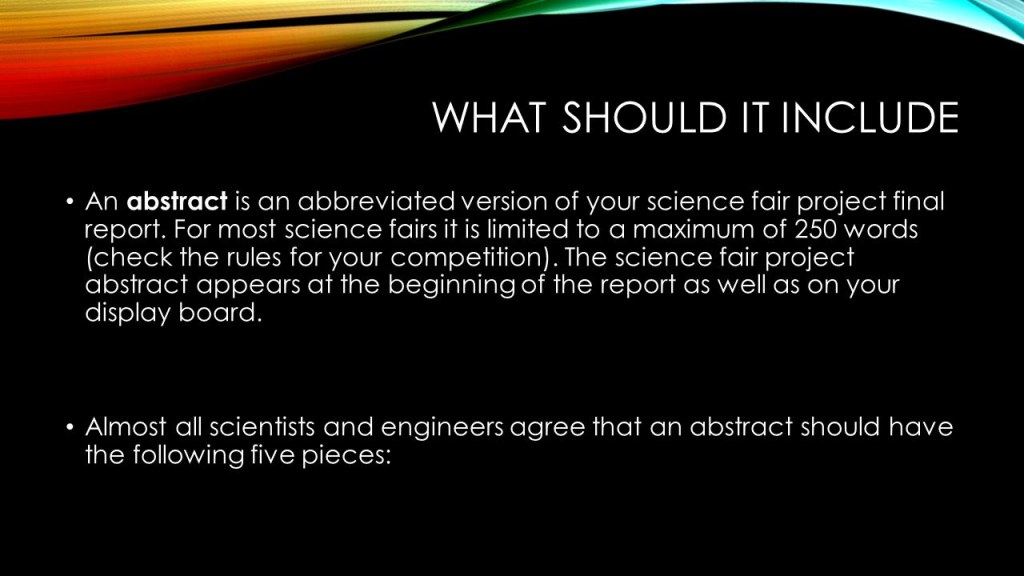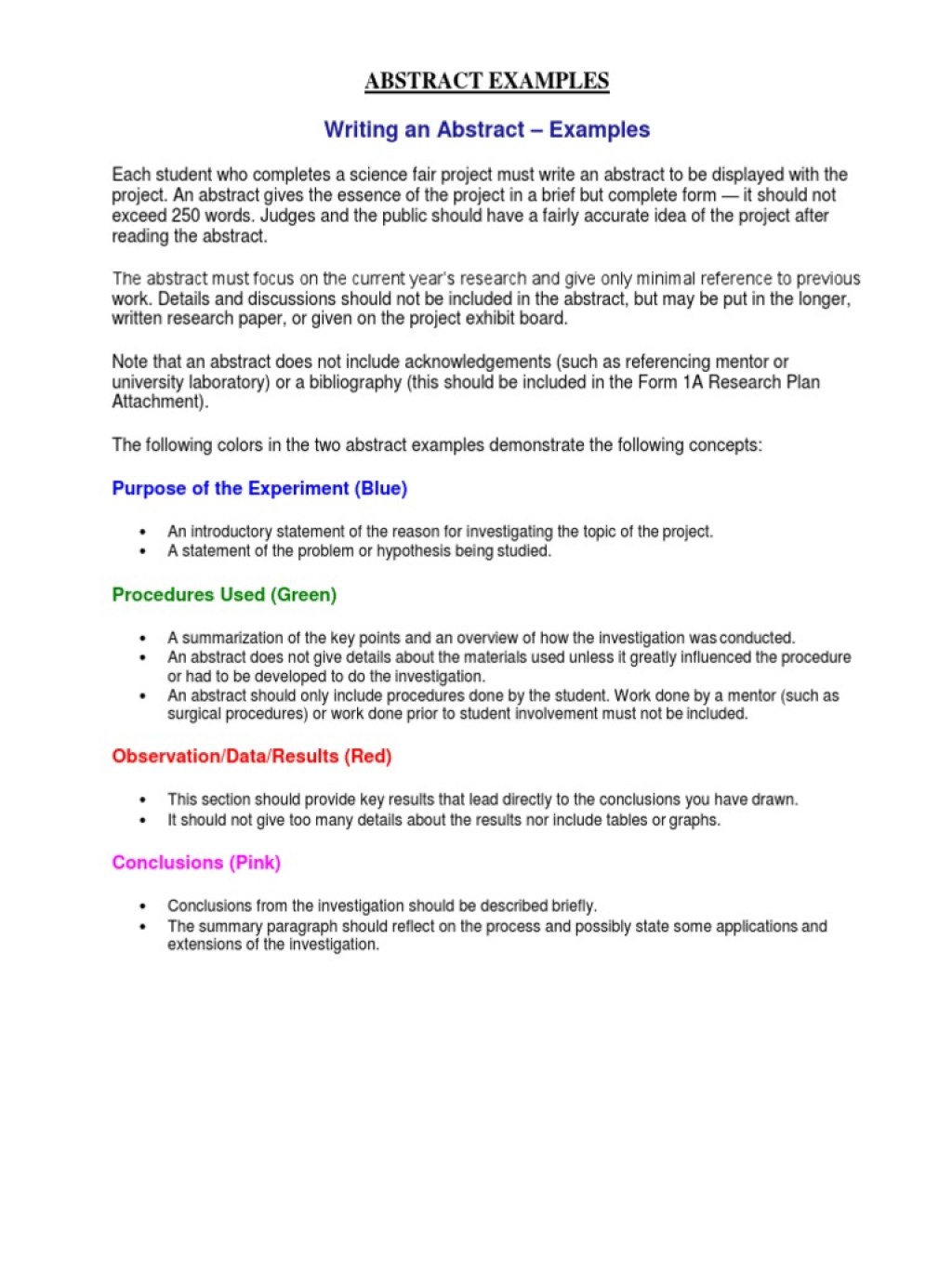Unlock Innovative Ideas: Engaging Science Project Abstract Samples For Inspiring Results!
Science Project Abstract Sample: Unlocking the Wonders of Scientific Inquiry
Introduction
Welcome, Smart Readers! In this article, we will explore the fascinating world of science project abstracts. Science projects are a crucial part of education, enabling students to apply their theoretical knowledge to practical experiments. A science project abstract serves as a concise summary of the project, allowing others to understand its objectives, methods, and results. In this article, we will delve into the components of a science project abstract and provide a sample abstract for your reference.
3 Picture Gallery: Unlock Innovative Ideas: Engaging Science Project Abstract Samples For Inspiring Results!



What is a Science Project Abstract?
🔬 A science project abstract is a brief summary of a scientific experiment or investigation. It provides a concise overview of the project’s purpose, methodology, and findings. By reading the abstract, readers can quickly grasp the essence of the project without having to read the entire report. This enables researchers, educators, and peers to assess the significance and relevance of the project.
Who Writes Science Project Abstracts?

Image Source: slideserve.com
👩🔬 Science project abstracts are typically written by students who have conducted experiments as part of their academic curriculum. Students at various educational levels, from elementary school to university, are required to submit abstracts as part of their science fair projects or research papers. Additionally, researchers and scientists may also write abstracts for their experiments to share their findings with the scientific community.
When to Write a Science Project Abstract?
⏰ A science project abstract is usually written after completing the experiment and analyzing the results. It is essential to write the abstract while the experiment is still fresh in mind to ensure accuracy and completeness. Science fairs, conferences, and academic journals often require abstract submissions, and adhering to their guidelines regarding deadlines is crucial.
Where to Use Science Project Abstracts?

Image Source: slideplayer.com
🌍 Science project abstracts have various applications. They are commonly used for science fairs, where students present their projects to judges and peers. Abstracts are also submitted to academic conferences, where researchers and scientists share their findings. Additionally, abstracts are published in scientific journals, allowing the broader scientific community to learn from and build upon the research.
Why are Science Project Abstracts Important?
❓ Science project abstracts play a vital role in scientific communication and knowledge dissemination. They allow researchers to share their findings with others, contributing to the collective understanding of scientific concepts. Abstracts also serve as a record of scientific progress, enabling future researchers to reference and build upon existing work. Moreover, science project abstracts provide students with an opportunity to hone their communication and presentation skills.
How to Write a Science Project Abstract?

Image Source: scribdassets.com
📝 Writing a science project abstract requires careful planning and attention to detail. Here are the essential elements to include:
Title: Provide a concise and informative title that accurately reflects the project’s content.
Objective: Clearly state the project’s objective or research question.
Methods: Describe the experimental design, materials used, and procedures followed.
Results: Summarize the key findings of the project, including relevant data and observations.
Conclusion: State the project’s conclusions and their implications.
Keywords: Include relevant keywords to help others find your abstract in searches.
Pros and Cons of Science Project Abstracts
👍 Advantages:
Effective Communication: Abstracts allow researchers to share their work with a broad audience in a concise manner.
Accessibility: Abstracts provide an accessible entry point to complex research, enabling readers to grasp the main points quickly.
Time-Saving: By reading abstracts, readers can determine if the full report is worth their time.
👎 Disadvantages:
Limited Detail: Abstracts offer a condensed version of the project, omitting some nuances and intricacies present in the full report.
Subjective Interpretation: Different readers may interpret abstracts differently, leading to potential misunderstandings.
Frequently Asked Questions (FAQs)
1. Q: Are science project abstracts required for all science projects?
A: Yes, science project abstracts are a standard requirement for most science projects, as they help summarize and communicate the project’s key aspects.
2. Q: How long should a science project abstract be?
A: Science project abstracts are typically limited to a specific word count, ranging from 100 to 300 words, depending on the guidelines provided.
3. Q: Can I include citations in my science project abstract?
A: Citations are generally not necessary in abstracts as they focus on summarizing the project rather than providing an extensive literature review.
4. Q: Can I use technical terms in my science project abstract?
A: It is recommended to use technical terms sparingly in abstracts and provide explanations or definitions when necessary to ensure broader accessibility.
5. Q: Can I change my science project abstract after submission?
A: It is best to avoid making changes to the abstract after submission, as it may create confusion or inconsistencies. Double-check for accuracy before submitting.
Conclusion
In conclusion, science project abstracts are essential tools for summarizing and communicating the main aspects of scientific experiments. By following the guidelines provided in this article, students and researchers can effectively present their work to a broader audience. Remember to keep your abstract concise, accurate, and engaging. Science project abstracts contribute to the advancement of scientific knowledge and serve as a stepping stone for future research and discoveries. Happy experimenting!
Final Remarks
Disclaimer: The information provided in this article is for educational purposes only. The sample science project abstract and guidelines presented here should serve as a reference and not be copied verbatim. Always follow the specific guidelines provided by your educational institution, science fair, or conference for writing your science project abstract.
This post topic: Abstract


![+] Abstract Wallpaper Neon - WallpaperSafari](https://romanlaure.info/wp-content/uploads/2023/07/abstract-wallpaper-neon-wallpapersafari-150x150.jpg)
